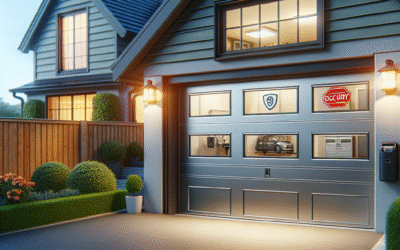Breaking Down Garage Door Service Costs: What to Expect and How to Save
When it comes to maintaining the security and curb appeal of your home, your garage door plays a pivotal role. Yet, many homeowners find themselves caught off guard by the costs associated with garage door services, from routine maintenance to unexpected repairs or full replacements. Understanding these expenses upfront can save you from unwelcome surprises and help you budget effectively for the care and upkeep of this essential home feature. Whether you’re dealing with a noisy door, broken springs, or simply exploring upgrade options, knowing what influences the cost of garage door services is the first step toward making informed decisions.
Garage door service costs can vary widely based on several factors, including the type of door, the nature of the repair, and the quality of materials used. Additionally, labor charges and regional pricing differences can impact your final bill. By gaining a clear understanding of these variables, you can better evaluate service quotes, avoid common pitfalls, and ensure you receive the best value for your investment. In this article, we’ll break down the key components that affect garage door service costs and provide practical tips to help you navigate this often confusing landscape with confidence.
Variety of Services Affect Costs
Garage door services encompass a range of tasks including installation, repair, maintenance, and replacement. Each service varies in complexity and time required, which directly impacts the overall cost.
Material and Door Type Influence Pricing
The type of garage door—whether steel, wood, aluminum, or composite—plays a significant role in pricing. High-quality or custom materials typically increase both installation and repair expenses.
Labor Charges Depend on Expertise and Location
Labor costs fluctuate based on the technician’s experience and the regional market rates. Urban areas or specialized services often come with higher labor fees compared to rural locations.
Parts and Components Add to Total Cost
Replacing worn-out parts like springs, cables, or openers can vary in price depending on the brand and quality. Genuine manufacturer parts usually cost more but offer better durability.
Regular Maintenance Can Save Money Long-Term
Investing in routine maintenance helps prevent costly repairs and extends the lifespan of your garage door. Scheduled inspections and tune-ups are cost-effective strategies to avoid unexpected expenses.
Introduction to Garage Door Service Costs
Garage doors are a crucial part of any home, providing security, convenience, and curb appeal. However, like any mechanical system, they require maintenance, repairs, and occasional replacements. Understanding the costs associated with garage door services can help homeowners budget effectively and avoid unexpected expenses. These costs vary depending on factors such as the type of service needed, the door material, the complexity of the system, and the region. This article breaks down the common garage door services and their typical price ranges to help you make informed decisions.
For more information, see garage door maintenance standards.
Common Types of Garage Door Services
Garage door services encompass a range of tasks including installation, repair, maintenance, and replacement of parts. Installation involves setting up a new door and can vary greatly depending on the door type—sectional, roller, or tilt-up. Repairs may address issues like broken springs, malfunctioning openers, damaged panels, or misaligned tracks. Regular maintenance includes lubrication, inspection, and adjustment to keep the door operating smoothly. Replacements might involve swapping out old components such as cables, rollers, or weatherstripping. Each service type carries its own cost considerations, so understanding what you need is the first step in estimating expenses.
Factors Influencing Garage Door Service Costs
Several factors impact the cost of garage door services. The door material—steel, wood, aluminum, or fiberglass—affects both repair and replacement prices, with wood typically being more expensive due to its weight and customization options. The size and style of the door also matter; custom or oversized doors require more labor and materials. Labor rates vary by location and company reputation, with some regions charging higher fees due to demand or cost of living. Additionally, the complexity of the problem, such as a broken torsion spring compared to a simple sensor adjustment, influences cost. Finally, emergency or after-hours services often come with premium charges. Being aware of these factors can help you evaluate quotes and avoid surprises.
Typical Cost Breakdown for Garage Door Repairs
When it comes to repairs, prices can range widely depending on the issue. For example, replacing a broken torsion spring—a common and potentially dangerous repair—typically costs between $150 and $350. Fixing or replacing garage door openers can range from $100 to $500, depending on the model and complexity. Repairing damaged panels may cost $200 to $600, influenced by the material and size of the panel. Track realignment or roller replacement usually runs between $100 and $200. It’s important (see garage door safety regulations) to get a detailed estimate that outlines parts and labor separately. Some companies may offer package deals for multiple repairs, which can provide savings.
Garage Door Installation Costs Explained
Installing a new garage door can be a significant investment but adds value and functionality to your home. The average cost for installation ranges from $700 to $2,500 or more. Basic steel doors are at the lower end of the spectrum, while custom wood or insulated doors push the price higher. Additional factors include the type of opener installed, with smart or high-tech models increasing overall costs. Labor fees depend on the complexity of installation, especially if modifications to the existing frame or electrical wiring are needed. Many installers include warranties on both the door and labor, which is a key consideration when evaluating cost versus value. For more information, see government garage door repair costs.
Maintenance Services and Their Cost Benefits
Regular maintenance is often overlooked but can save money in the long run by preventing major repairs. Maintenance services typically include lubricating moving parts, tightening hardware, testing the balance and safety features, and inspecting the door’s condition. These services usually cost between $100 and $200 annually. Investing in routine maintenance can extend the lifespan of your garage door, improve safety, and ensure smooth operation. Some service providers offer maintenance plans at discounted rates, which is a smart option for homeowners who want to avoid costly emergency repairs.
How to Choose a Garage Door Service Provider
Selecting the right service provider is crucial to getting quality work at a fair price. Start by researching local companies with strong reputations and verified customer reviews. Request multiple quotes to compare pricing and services offered. Ensure the provider is licensed and insured, which protects you from liability and ensures professional standards. Ask about warranties on parts and labor, as these can save money if issues arise after the service. Additionally, inquire about emergency or same-day services if you anticipate urgent repairs. A trustworthy provider will be transparent about costs and willing to explain the work needed.
Tips for Budgeting and Saving on Garage Door Services
To manage garage door service costs effectively, start by scheduling regular maintenance to catch problems early. When repairs are needed, get multiple estimates and don’t hesitate to ask for discounts or bundled service packages. Consider the quality and durability of parts—cheaper components might save money upfront but could lead to more frequent repairs. If you’re handy, some minor maintenance tasks like lubrication or cleaning can be done yourself to reduce labor costs. Finally, plan for garage door expenses as part of your home maintenance budget to avoid financial strain when unexpected issues occur.
Understanding Warranty and Insurance Coverage
Many garage door components and services come with warranties that cover defects or premature failures. It’s important to understand what your warranty covers and for how long, as this can significantly impact your out-of-pocket costs. Additionally, check if your homeowner’s insurance policy includes coverage for garage door damage due to events like storms or accidents. Some policies may require you to pay a deductible, but coverage can reduce repair or replacement expenses. Always keep documentation of service and repairs, as this may be required for warranty claims or insurance purposes.
Conclusion: Making Informed Decisions About Garage Door Costs
Garage door services can range from affordable routine maintenance to costly repairs or replacements. By understanding the types of services, factors influencing costs, and how to choose a reliable provider, homeowners can make informed decisions that protect their investment. Regular maintenance is key to minimizing expenses, while careful budgeting and research help avoid surprises. Whether you’re installing a new door or fixing a broken spring, knowing what to expect financially empowers you to maintain a safe, functional, and attractive garage door for years to come.
1. What factors influence the cost of garage door services?
The cost of garage door services can vary based on several factors including the type of service needed (repair, installation, or maintenance), the materials used, the size and style of the door, labor costs in your area, and whether any additional parts or upgrades are required. Emergency service calls or same-day repairs may also increase the price.
2. How much does it typically cost to repair a garage door?
Garage door repair costs generally range from $100 to $400 depending on the issue. Minor repairs like fixing a broken spring or replacing a sensor might be on the lower end, while more complex repairs such as motor replacement or track realignment can be more expensive. Always get a detailed estimate before proceeding.
3. What is the average cost of installing a new garage door?
Installing a new garage door typically costs between $700 and $2,500. The price depends on the door material (steel, wood, aluminum), door size, insulation options, and whether you choose a manual or automatic opener. Custom designs and premium materials will increase the overall cost.
4. Are there any ongoing maintenance costs for garage doors?
Yes, regular maintenance such as lubrication, tightening hardware, and safety inspections can cost between $100 and $200 annually. Routine maintenance helps extend the lifespan of your garage door and prevent costly repairs in the future.
5. Does the type of garage door opener affect service costs?
Yes, different types of garage door openers (chain drive, belt drive, screw drive, or smart openers) have varying repair and replacement costs. Smart or high-tech openers tend to be more expensive to fix or replace due to their advanced features and components.
6. How can I save money on garage door services?
You can save money by scheduling regular maintenance to avoid major repairs, comparing quotes from multiple service providers, and choosing standard door sizes and materials. Additionally, addressing small issues promptly can prevent them from becoming costly problems.
7. Is it worth repairing an old garage door or should I replace it?
If your garage door requires frequent repairs or if the cost of fixing it approaches the price of a new door, replacement might be more cost-effective. New doors often come with warranties and improved energy efficiency, which can save money in the long term.
8. Are garage door service costs covered by homeowners insurance?
Typically, routine maintenance and wear-and-tear repairs are not covered by homeowners insurance. However, damage caused by sudden events like storms or accidents may be covered. It’s best to review your policy or consult with your insurance provider for specific coverage details.
9. How long does a typical garage door service appointment take?
Most garage door service appointments, including repairs and maintenance, take between 1 to 3 hours depending on the complexity of the job. Installation of a new door may take longer, often a full day or more, especially for custom or double doors.
10. Should I hire a professional or attempt garage door repairs myself?
While minor maintenance tasks like lubrication can be done safely at home, most garage door repairs involve complex mechanisms and heavy components that require professional expertise. Hiring a licensed technician ensures the job is done safely and correctly, helping avoid injury or further damage.
Conclusion: Making Informed Decisions on Garage Door Service Costs
Understanding the various factors that influence garage door service costs is essential for homeowners looking to maintain or upgrade their garage doors efficiently. From the type of repair needed and the materials used to labor charges and emergency service fees, each element plays a significant role in the final price. Being aware of these components helps in budgeting accurately and avoiding unexpected expenses. Additionally, investing in regular maintenance can prevent costly repairs down the line, ensuring your garage door operates smoothly and safely for years to come.
When it comes to choosing a reliable garage door service provider, don’t settle for the lowest price alone—consider the quality of service, reputation, and warranty offered. Taking the time to research and compare quotes will empower you to make the best decision for your home and budget. Ready to get your garage door serviced by trusted professionals? Contact a local expert today to schedule an inspection or repair and enjoy peace of mind knowing your garage door is in capable hands.





0 Comments